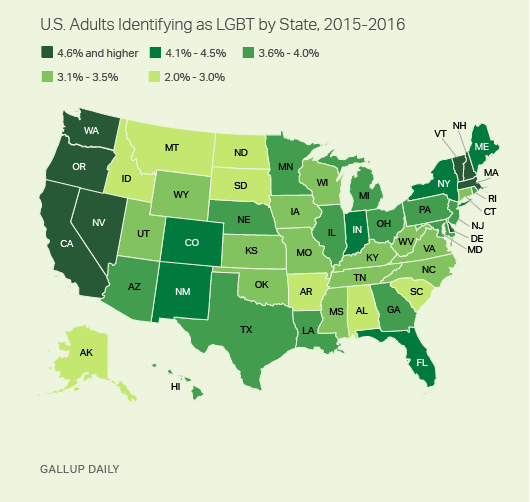1out 3 LGBTQ Leaves in The South and They are Transforming Their Neighborhoods

USA TODAY
For the LGBTQ community, the South is known as a region that often hangs an unwelcome sign on its door.
A report out Tuesday reveals an eye-opening fact: Nearly one in three LGBTQ people, or 32%, call the South their home. And the area is transforming, led by LGBTQ Southerners of color who are devising unique ways to build communities and uplift lives.
The report by the Movement Advancement Project, the Campaign for Southern Equality and the Equality Federation documents the striking numbers – 93% of LGBTQ Southerners live in states with low or negative equality rankings – with the work of groups navigating around rigid policies, entrenched attitudes and scant statewide protections.
“There are issues of urgent need,” said Logan Casey, MAP policy researcher. “Economic insecurity, health issues, access to health care, housing …. Basic human needs that can’t always wait for the government process. In many cases, these are LGBTQ people of color taking care of each other. It’s not surprising they will take care of one another when government doesn’t.”
The numbers:
• About 3.6 million LGBTQ adults, including over 525,000 transgender adults, live in the South, more than any other region in the U.S.
• More than 40% of LGBTQ people in the South are people of color: 22% are Black; 16% are Latino.
Pride and racial equality: LGBTQ groups seek 'to stand in solidarity with the black community'
The report shows that “LGBTQ people are everywhere. They permeate the American fabric and that includes the South,” MAP Executive Director Ineke Mushovic said. “LGBTQ Southerners have shown extra resilience. They are thinking differently about how to make change happen.” The barriers LGBTQ people face in the South are well-documented in the report: There are higher rates of harassment, violence and unemployment.
Eight Southern states have targeted religious exemption laws that allow businesses and service providers to refuse to serve people if doing so would conflict with their religious beliefs.
LGBTQ people of color can face layered barbs of bias. For example, LGBTQ people of color are more than twice as likely as white LGBTQ people to experience discrimination because of their identity when interacting with police, the report shows.
While 23% of all LGBTQ Southerners have personally experienced physical violence related to their sexual orientation and/or gender identity, that number rises to 33% among Black LGBTQ Southerners.
How to be an ally:Pride Month is over, but the work isn't. 5 ways you can be an ally to the Black LGBTQ+ community
“It is a microcosm of what we are seeing in America as a whole. Racism is real, LGBTQ discrimination is real,” Mushovic said. ”If you are an LGBTQ person of color you are living in two ways that allow people to discriminate against you.”
Comments